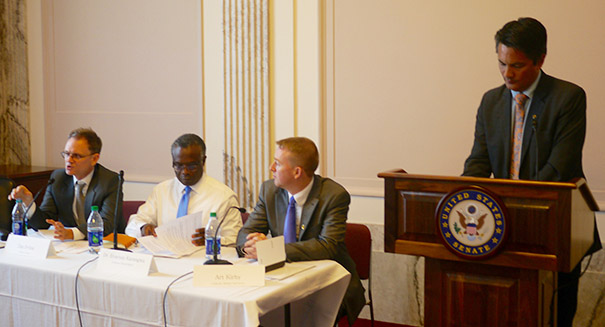
CWS Executive Vice President Maurice Bloem (right) moderates the panel at Setting the Global Table: Faith, Food Security and Nutrition.
The Interfaith Working Group of Foreign Assistance was formed in April 2013 to bring together Christian, Jewish, Muslim and other faith communities to advocate for robust funding of humanitarian and poverty focused development assistance. The IWGFA currently includes 50 participating organizations and is co-chaired by Bread for the World and CWS (the latter is represented by Martin Shupack, Director of Advocacy). Congressional visits, sign-on letters, call-in days and organizing Congressional briefings in support of foreign assistance are a few of IWGFA’s activities. At the end of last month, the IWGFA held a Congressional briefing on Setting the Global Table: Faith, Food Security and Nutrition in partnership with Faith for International Assistance and co-sponsored by Senators Boozman, Casey, Durbin and Moran. Thirty Congressional staffers among others attended. Maurice A. Bloem, Executive Vice President of CWS, moderated the event’s panel.
Why should we act on food security and nutrition?
Two billion of the world’s seven billion people suffer from malnutrition, and 795 million are hungry. We know from the Global Nutrition Report that the annual GDP losses from low weight, poor child growth and micronutrient deficiencies average 11 percent in Asia and Africa, which is greater than the loss experienced during the 2008–2010 financial crisis. Here in the United States, for example, when one person in a household is obese, the household faces additional annual healthcare costs equivalent to 8 percent of its annual income.
Now, 2016 and 2017 bring major opportunities to translate this commitment into action.
One of the largest opportunities is countries’ adoption of their own targets related to the Sustainable Development Goals. In the US, the passing of the Global Food Security Act (H.R. 1567/S. 1252) deserves a huge applause as the bill responds to the full spectrum of global food security needs.
The purpose of the IWGFA Congressional briefing was to highlight the importance and effectiveness of USG programs in partnership with the faith community in implementing nutrition and food security programs. Stories often provide the best examples of that partnership, and we were fortunate to have a great panel with the ability to share their significant change stories.
The stories of the panel reminded the audience that Faith-Based Organizations specializing in international development and humanitarian aid are important strategic and implementing partners with the U.S. government. FBOs are often on the front lines, fully engaged with and trusted by communities where they work.
Whether FBOs receive federal funding or not, it was agreed that the work would not be nearly as effective — or at times even possible — without U.S. government engagement. The US government’s ability to negotiate pricing on essentials such as ARVs and vaccines, its convening powers, influence in economic development and human rights, and of course, funding, all contribute to helping effectively meeting the needs of those most marginalized. The same can be said about the work around refugee protection and resettlement. The passage of the Global Food Security Act ensures the continuation of a vital U.S. role in ending global hunger and malnutrition.
All three panelist called attention to the importance of the faith community as a trusted partner in the community and how their programs have been successful. Art Kirby, Head of Programs-Ethiopia (Emergency food programs) from Catholic Relief Services emphasized the importance of working with local partners and the ability of faith based organizations to leverage U.S. government funding to the fullest. Dr. Evariste Karangwa, Lutheran World Relief’s Senior Director for Africa (Agriculture Development) explained about how working with small-holder famers is crucial for establishing food security. “We need to pay attention to ‘new’ forms of malnutrition which includes the 40 million obese children in the world”, said Dan Irvine, Senior Director of Operations, Health and Nutrition of World Vision International when he spoke about nutrition being key for hunger and poverty eradication.
In closing the message of the Congressional Briefing was summarized by keeping the word IMPACT in mind:
I stands for Invest in nutrition as the key to reaching the Sustainable Development Goals. Research has taught us that preventing malnutrition delivers US$16 in return of investment for every US$1 spent.
M reminds us that addressing Malnutrition in ALL its forms is crucial.
P is for the need for Political Will and action based on more data.
A stands for Agriculture as this sector is being 11 times as important for poverty reduction than other sectors.
C is both for Climate Change (leading to more displacement and increased food insecurity) as well as Collaboration between FBOs and the Government proven to be effective and flexible when needed.
And last but not least T for the Thousand days from pregnancy to a child’s second birthday, which are crucial for both women and their children. Not only ensuring that women set the table, but that they sit at the table as an equal partner as well.
Maurice A. Bloem is Executive Vice President of CWS. Follow him on Twitter @mauricebloem.
Martin Shupack is Director of Advocacy of CWS.
